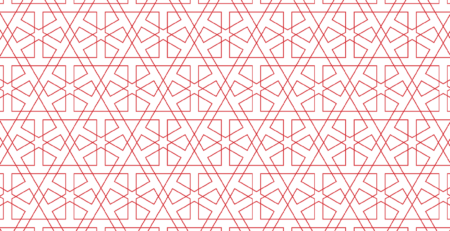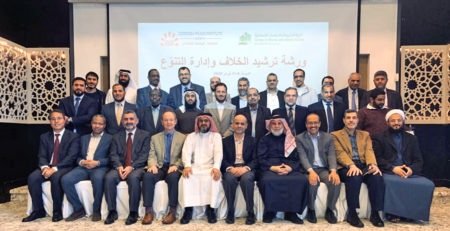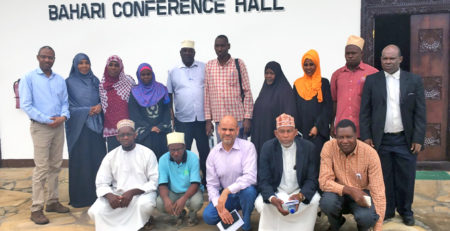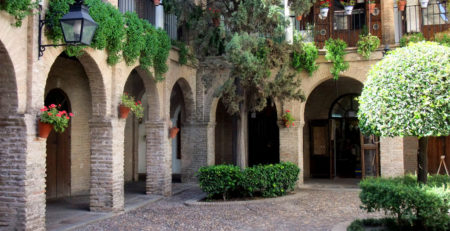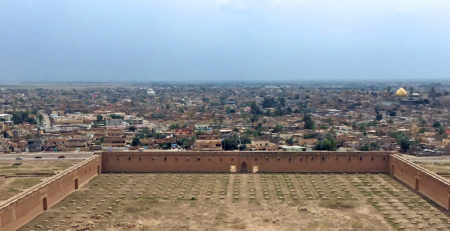The Cordoba Update 8/2017
|
The bi-weekly CORDOBA UPDATE is the product of continuous monitoring work, carried out by the Cordoba Foundation of Geneva team. By analysing and reporting on key events and trends in the Foundation’s areas of interest, we aim to draw readers’ attention to pertinent developments in North Africa, the Sahel, West Asia and Europe, which are not always covered in ‘mainstream’ media. In addition to sharing news from these four regions, the Cordoba Update is an opportunity for the Foundation to provide regular updates on its publications, events and other developments. In line with the programmes and projects funded by partners of the Cordoba Foundation of Geneva, updates and information are included under the following themes:
For questions and/or feedback regarding the content and form of the Cordoba Update, please contact Sarah Franck: sarah.franck@cordoue.ch Le CORDOBA UPDATE est un bimensuel qui présente le travail continu de suivi réalisé par l’équipe de la Fondation Cordoue de Genève. Par l’analyse des événements et tendances qui concernent les domaines d’intérêt de la Fondation, nous visons à attirer l’attention de nos lecteurs sur les développements pertinents en Afrique du Nord, dans le Sahel, en Asie de l’Ouest et en Europe, une actualité qui n’est pas toujours couverte dans les médias dits ‘traditionnels’. Outre le partage de l’actualité de ces quatre régions, le « Cordoba Update » est un moyen pour la Fondation de fournir des mises à jour régulières sur ses publications, événements et autres développements. En accord avec les programmes et projets financés par les partenaires de la Fondation Cordoue de Genève, les mises à jour et informations concernent les thèmes suivants :
Pour des questions et / ou des commentaires concernant le contenu et la forme du Cordoba Update, veuillez contacter Sarah Franck : sarah.franck@cordoue.ch |
EVENTS/EVENEMENTS
Dakar 2-3 mai 2017, Rencontre de la quatrième Plateforme Sahel pour les projets de promotion de la paix
La Fondation Cordoue de Genève en partenariat avec le Département fédéral des affaires étrangères Suisse, a organisé du 2 au 3 mai 2017, à Dakar (Sénégal), la quatrième Plateforme Sahel. Cette rencontre, qui avait pour but de faire le suivi des projets de promotion de la paix dans la région du Sahel, a réuni des participants venant du Mali, du Tchad, du Niger, du Nigeria, de Mauritanie et du Sénégal. La réunion était composée d’une trentaine de participants, dont des leaders religieux, des jeunes, des femmes, des représentants de la société civile, du monde des médias et du monde politique, entre autres. Les discussions enrichissantes et constructives ont permis de dégager des pistes de travail intéressantes qui vont être développées au cours de l’année 2017 avec la coopération des acteurs locaux.
TRANSITION AND POLITICAL PARTICIPATION / TRANSITION ET PARTICIPATION POLITIQUE
Egypt, 05.05.2017: Egypt Back Under Emergency Law
Sherif Mohy Eldeen, a researcher on counterterrorism and human rights at the Egyptian Initiative for Personal Rights, argues that Egypt’s reinstated state of emergency is ineffective in fighting terrorism and gives security forces yet another excuse to tighten their crack-down on the opposition. He adds, “the ineffectiveness of the state of emergency is exemplified by the undeniable deterioration of affairs in North Sinai despite a local state of emergency and curfew that have already been in place in the governorate since 2014.” According to reports by the Tahrir Institute for Middle East Policy, North Sinai had 261 terrorist attacks in 2013, which increased after the local state of emergency was imposed to 681 attacks in 2016. Mohy Eldeen concludes that the state of emergency has been used to consolidate the authoritarian regime and further repress opposition voices more than it has actually tackled militant violence and terrorism.
Meanwhile, Human Rights Watch has said that Egyptian military forces in the northern Sinai Peninsula executed at least two and as many as eight unarmed detainees and covered up the killings to make it appear that the victims were armed “terrorists” shot to death in a raid. Video of the killings, aired on April 20, 2017 by a television channel aligned with the Muslim Brotherhood and based in Turkey, appears to show a man in a camouflage uniform executing the two detainees, one after the other, with an assault rifle. Two Sinai sources identified the executioner as a well-known member of a local militia that works at the behest of the Egyptian military. The video also appears to show a member of Egypt’s military intelligence service observing and directing the first execution and that the soldiers used Humvee vehicles supplied by the United States to transport the detainees. Other videos and photographs Human Rights Watch reviewed corroborate the incident.
Links for more information:
http://carnegieendowment.org/sada/69886
https://www.hrw.org/news/2017/04/21/egypt-videos-show-army-executions-sinai
Egypt, 07.05.2017: Overpopulation, Religion and Fatwas on Demand in Egypt
Sisi insists that population growth is one of the main culprits in the economic crisis, as did the regime of former President Hosni Mubarak who organized intensive media campaigns and wide-scale health programs. Sisi also adheres to his predecessor’s path by calling for support from religious authorities, whose position has always been opposed to the idea of birth control (known in Arabic as tahdeed), instead permitting birth planning (known in Arabic as tanzeem). While Al-Azhar’s Grand Sheikh presented the president with the fatwa he wanted on birth control — in contradiction to other official fatwas presented on televised public occasions — he refused to do the same when it came to the issue of verbal divorce. During his National Police Day speech on January 25, Sisi suggested bringing an end to verbal divorce by making the presence of a government authorized cleric necessary for a divorce to take place. Addressing the Grand Sheikh, he said, “What do you think virtuous Imam?” This time, Tayyeb simply smiled but provided no fatwa. The fatwa came days later in the form of a statement issued by the Council of Senior Scholars at Al-Azhar, refuting the president’s view. Some have perceived Tayyeb’s lack of compliance as an indication that he is reaching the end of his patience with the president’s insistence on collecting fatwas on-air without prior agreement.
Links for more information:
http://www.madamasr.com/en/2017/05/07/feature/society/overpopulation-religion-and-fatwas-on-demand-in-egypt/
http://www.madamasr.com/en/2017/02/07/feature/politics/tensions-arise-between-al-azhar-and-presidency
Lebanon, 09. 05.2017: Parliamentary Elections, could the Parliament’s vote on a new electoral law spark a new civil war?
On Thursday, May 5, President Michel Aoun dedicated the Cabinet session he led at Baabda Palace to deliberating an electoral law and encouraged voting if there was no agreement on an election law in order to avoid a vacuum in the legislative body.
The Cabinet, which met for the first time since April 10, had a general debate on a new electoral law, and ministers unanimously agreed on refusing a new extension of Parliament’s period, which expires on June 20.
However, Speaker Nabih Berri and MP Walid Jumblatt have recurrently advised of the grave consequences involved in a vote on a new electoral law to govern the imminent parliamentary elections, and called for consensus on this critical question, affirming that a parliamentary vote is likely to further escalate political divisions.
From his side, Hezbollah leader Sayyed Hasan Nasrallah had also alerted against a vote on a draft electoral law by calling for understanding among opposing parties on this question.
But can a solution be reached soon to end the deadlock over an election law to substitute the contested 1960 majoritarian law?
As the Cabinet has unanimously rejected an extension of Parliament’s term under any circumstances, President Aoun emphasized the need to fulfill Article 65 of the Lebanese Constitution which specifies that Cabinet decisions are taken by consensus, as he vowed to prevent an extension of Parliament’s mandate, declaring his support for voting on a new electoral law as a solution to end the impasse. In answer to some of the parties who had submitted election laws proposing the abolition of political confessionalism as stipulated in the Taif Accord, he said: “We are in the process of preparing for parliamentary elections. I think everyone must sacrifice in order to reach where we want.”
Minister Gebran Bassil, the leader of the Free Patriotic Movement and the Minister of Foreign Affairs, also supported the voting as a means to avoid an extension and a legislative vacuum, as did the representatives of the Lebanese Forces, the FPM’s ally, and the Kataeb Party.
Finance Minister Ali Hasan Khalil, a top political aide to Berri who frequently represents the Amal Movement considered that if the Constitution provides for a vote in Article 65, the Constitution’s preamble emphasizes coexistence, which he considers to be prevailing in this case.
On the other hand Prime Minister Hariri considers the new election law to actually be an opportunity for Lebanon to tackle one of its main concerns that has been dragging on for years, and seems confident in reaching a comprehensive solution as a proof of the progress made by his government till date.
In the face of increasing disapproval of the extension of Parliament’s term, the question remains as to whether the May 15 session will be held if the Cabinet does not reach agreement on a new electoral law.
Links for more information:
https://www.lorientlejour.com/article/1047512/aoun-nous-aurons-une-nouvelle-loi-electorale.html
http://yalibnan.com/2017/04/13/lebanons-aoun-blocks-extension-of-parliament-extension/
http://janoubia.com/2017/04/05/
https://www.lebanese-forces.com/2017/05/09/fire-under-the-electoral-ashes-and-civil-society/
RELATIONS BETWEEN COMMUNITIES OF DIFFERENT ETHNIC, CULTURAL AND RELIGIOUS AFFILIATIONS /
RELATIONS ENTRE COMMUNAUTÉS DE DIFFÉRENTES AFFILIATIONS ETHNIQUES, CULTURELLES ET RELIGIEUSES
Iraq, 20.04.17 – 04.05.17: Tensions within Sunni- and Shia-dominated Political Parties over Iraq’s Future
Tensions within and between Iraq’s political parties have been escalating consistently in the lead-up to the provincial elections that are expected to take place in 2017. On 30 April, Iraq’s parliamentarians voted to ban politicians from participating in foreign conferences without the express permission of the relevant parliamentary authorities, according to a local source. The move is apparently a reaction to two conferences held in Switzerland and Turkey, which aimed to promote better cooperation between Iraq’s Sunni politicians. The parliament’s reaction has been interpreted as evidence of growing competition for numerous regions of the country that are (or have recently been) under the control of the armed group called the Islamic State.
According to a local journalist, Iraq’s main Sunni politicians, including Salim al-Jibouri, Osama al-Nujaifi, Saleh al-Mutlaq, Jamal al-Karbouli, Ayad Allawi, and their respective parties, are currently in competition for influence in Ninewa – and its capital, Mosul – in Anbar and in Salaheddin. Salim al-Jibouri, who “heads a fairly broad Sunni alliance” in parliament, is known for his close relationship with Iraq’s powerful Shia politicians as well as another group of Sunni Muslim politicians, including Ahmad Abdullah al-Jibouri, Abdul Rahman al-Luwaizi and Sadoun al-Dulaimi, who have abandoned “their original Sunni alliances” and have also stated their allegiance with Shia political forces. A number of clerics and religious institutions have also joined this group, seeking to participate in the 2017 elections through collaboration with the larger and wealthier Shia political blocs in Baghdad.
These Sunni politicians are currently divided over how to address the problems facing Sunni-majority parts of the country that have been occupied by the Islamic State group since 2014. For example, Salim al-Jibouri has supported Shia parliamentarian Ammar al-Hakim’s plan for national reconciliation, called the Historic Settlement. On the other hand, Osama al-Nujaifi and his close ally, Iraqi businessman Khamis Khanjar, have advocated for a semi-autonomous Sunni Muslim-majority region formed of Ninewa, Anbar and Salaheddin provinces.
Signs of tensions between Shia parliamentarians in the Iraqi National Alliance, which is comprised of Ammar al-Hakim’s Muwatin bloc, Nouri al-Maliki’s State of Law coalition and Muqtada al-Sadr’s Ahrar bloc, have also become more evident in recent weeks. The Alliance has dominated politics since the end of the Baathist government. However, al-Hakim’s announcement of his planned withdrawal as the leader of the alliance hints that its internal political divisions are worsening. Furthermore, al-Sadr’s attempts at building closer relationships with other groups, including secular and liberal movements, has been seen as an indication that this political alliance is faltering.
Among the contentious issues of the Alliance are the questions of who should occupy the post of Prime Minister and what the future of the increasingly-powerful Popular Mobilisation Units should be. The State of Law coalition apparently favours maintaining their associated militias as a “semi-permanent force in addition to the army and the police,” while the Ahrar bloc has indicated that “their associated militia should be disbanded.” Muwatin bloc has yet to announce an official position on the issue.
In concert with the discord of Iraq’s Sunni political class; the apparent frictions within the Shia alliance; consternation around the growing power of the so-called Popular Mobilisation Units; and the strains on relations between Baghdad and the Kurdistan Regional Government over its planned independence referendum, Iraq’s upcoming provincial elections, and its parliamentary elections expected in 2018, are viewed as a crucial political opportunity for a re-distribution of power among the nation’s powerful elites – both old and new.
Links for more information:
http://www.niqash.org/en/articles/politics/5569/Iraq
http://www.niqash.org/en/articles/politics/5561/Iraq
http://www.al-monitor.com/pulse/originals/2017/04/iraq-abadi-shiite-militias-qatar-iran-pmu
https://www.alaraby.co.uk/english/indepth/2017/5/3/decades-long-iraqi-kurdish-alliance-at-risk-of-deterioration
VIOLENT EXTREMISM AND THE WAR ON TERROR / EXTRÉMISME VIOLENT ET LA GUERRE CONTRE LA TERREUR
Egypt & Germany, 24.04.2017: Security Agreement Risks Complicity in Abuses
The German parliament has approved a security agreement with the Egyptian Interior Ministry, passing the agreement on April 28, 2017. According to Human Rights Watch, who had urged the German parliament to reject it, the agreement lacks human rights protections and is with a security agency whose officers have committed torture, enforced disappearances, and most likely extrajudicial killings. As a result, it could make German officials complicit in serious human rights violations.
The agreement establishes cooperation in a number of fields, most importantly in combating terrorism. It obliges the authorities of both countries to cooperate in investigations, share information about suspects, and carry out joint operations. It includes only the vaguest reference to “upholding human rights” and lacks any effective guarantee that the major human rights abuses by Egyptian security agencies will end. “If the German government wants to help protect German and Egyptian citizens from terrorism while respecting human rights, this is a terrible way of going about it,” said Wenzel Michalski, Germany director at Human Rights Watch. “The German government should be getting cast-iron guarantees that Egypt is calling a halt to its abuses, not rushing to put its agents next to Egyptian forces on the front line of repression.”
Egyptian Interior Minister Magdy Abd al-Ghaffar signed the agreement with his German counterpart, Thomas de Maizière, in July 2016, but it had not yet been ratified by the German Bundestag.
Finally, massive controversy dominated the political scene in Egypt in the wake of statements released by the United Nations High Commissioner for Human Rights, Ra’ad bin Zeid al-Hussein, which included accusations that the Egyptian government had inadvertently increased extremism by implementing hard-line, repressive security measures. The statements came as part of a UN report by Hussein focusing on violations against freedoms around the world during a UN press conference held in Switzerland. Besides Egypt, the report also addressed criticism at a number of countries where violations against human rights have been reported, such as Turkey and the US. On Egypt, the report stated: “…a state of emergency, the massive numbers of detentions, reports of torture and continued arbitrary arrests – all of this we believe facilitates radicalization in prisons.”
The report mentioned Egypt’s crackdown on NGOs and civil society work, which has also fostered extremism.
Links for more information:
https://www.hrw.org/news/2017/04/24/germany/egypt-agreement-risks-complicity-abuses
http://www.egypttoday.com/Article/2/4504/Egypt-Germany-security-cooperation-agreement-to-enter-into-force
http://english.ahram.org.eg/NewsContent/1/64/233039/Egypt/Politics
http://www.egyptindependent.com/news/un-reports-egypt-s-human-rights-status
Bahrain, 25.04.17: 36 Bahrainis Convicted on Terrorism Charges and Stripped of Nationality
The New Arab and the Bahraini newspaper, Al Wasat, have reported that a Bahraini court has found 36 Shia nationals guilty of possessing explosives and of “forming an illegal group that aimed to jeopardise the constitution and laws… using terrorism as one of its means.” According to these sources, the court ruled that all 36 defendants should be stripped of Bahraini nationality, with three receiving life prison terms and the rest receiving between three and ten-year sentences. According to Al Wasat’s report, two defendants were accused of receiving training abroad before returning to establish a terrorist cell inside Bahrain and recruiting members to carry out unlicensed marches, riots and attacks on members of the security forces. However, an Amnesty International report on the same case suggested that some 32 Bahrainis were sentenced, including “human rights defenders, political activists, lawyers, a journalist and relatives of victims of human rights violations.” According to this report, at least 24 persons were charged with “illegally gathering” in Duraz village in western Bahrain, while others stood accused of terrorism-related charges. The state-run Bahrain News Agency reported only that two persons were sentenced to ten years each and that both had their Bahraini citizenship revoked.
Links for more information:
https://www.alaraby.co.uk/english/news/2017/4/26/bahrain-strips-36-shia-nationals-of-citizenship
http://www.alwasatnews.com/news/1234265.html
https://www.amnesty.org/en/latest/news/2017/04/bahrain-32-dissidents
http://bna.bh/portal/en/news/782545
Niger, 10.05.17: Le Mali, le Tchad et le Niger signent un accord de coopération judiciaire
Le Niger, le Mali et le Tchad, confrontés à une insécurité récurrente du fait des groupes armés violents à référence religieuse et aux trafics de toutes sortes, ont signé, le 10 mai, à Niamey, un accord qualifié d’ « historique » de coopération judiciaire.
Selon le ministre tchadien de la justice, Mahamat Hassan les frontières entre le Mali, le Tchad et le Niger n’existent plus en matière judiciaire. Il a salué un « accord historique » dans la lutte contre le terrorisme et la criminalité transfrontalière.
Pour son homologue nigérien, Marou Amadou la signature de cet accord interviendrait à un moment où le Niger, le Mali et le Tchad seraient confrontés aux « grands défis de l’heure », à savoir le terrorisme et le crime organisé, le trafic de drogue, la traite des personnes et le trafic d’armes. Selon lui, « l”ingéniosité » des terroristes et des trafiquants aurait pris le pas sur des procédures judiciaires qu’il qualifie de classiques, longues et complexes.
Cet accord signé par les ministres de la justice de ces trois pays de la bande sahélienne, prévoit la mise en place de commissions rogatoires internationales, l’échange entre les Etats des actes judiciaires, la comparution des témoins, experts et personnes poursuivies. Il vise également la mise en place d’une politique de coopération en cas d’extradition. Il autorise enfin des enquêtes conjointes et le transfert des poursuites.
Pour rappel, les trois pays signataires font face à une violence soutenue et entretenue, entre autres, par des groupes armés violents à référence religieuse, notamment le groupe nigérian Boko Haram et la nébuleuse d’Al Qaida, formée de plusieurs groupuscules unis autour du label des Défenseurs de l’Islam et des Musulmans que dirige le malien Iyad Ag Ghali, leader du groupe Ançar Dine.
Liens pour plus d’informations :
http://fr.africatime.com/niger/articles/accord-judiciaire-historique-entre-le-niger-le-tchad-et-le-mali
http://www.jeuneafrique.com/436857/politique/niger-mali-tchad-signent-accord/
http://www.jeuneafrique.com/mag/435824/politique/drogue-agadez-colombienne-niger/
http://www.tamtaminfo.com/transit-de-vente-de-vehicules-doccasion-libyens-a-agadez/
http://www.jeuneafrique.com/370563/politique/jihadisme-lafrique-passe-de-perdre-bataille-contre-radicalisation-jeunes/
http://www.jeuneafrique.com/mag/296482/politique/terrorisme-sahel-lere-black-jihad/
Mali, 30.04.2017: Face à la recrudescence de la violence le gouvernement prolonge l’état d’urgence
Le gouvernement malien a décidé de reconduire l’état d’urgence de six mois. Ce dernier devait expirer le 30 avril 2017, il restera en vigueur jusqu’au 31 octobre 2017. L’Assemblée nationale, consultée à ce sujet a finalement voté la prorogation à l’unanimité.
Cette mesure d’exception avait été instaurée à plusieurs reprises dans le pays depuis l’attaque perpétrée le 20 novembre 2015 contre l’hôtel Radisson Blu de Bamako, par des combattants affiliés à des groupes violents à référence religieuse et qui avait fait 22 morts, dont deux assaillants.
Le 19 avril 2017 l’état d’urgence avait été rétabli par le gouvernement malien et pour dix jours , en raison de la persistance, selon un communiqué officiel, de la menace terroriste ainsi que des risques d’atteinte grave à la sécurité des personnes et de leurs biens.
Entre-temps, la violence s’accroit. Ces dernières semaines, de multiples attaques meurtrières ont en effet été menées contre des positions de l’armée malienne, des camps de la Minusma et des convois attaqués. Ces attaques ont fait des dizaines de morts, plusieurs blessés et de nombreux dégâts.
La recrudescence de violence a poussé le Comité International de la Croix Rouge (CICR) à suspendre ses activités dans certaines zones, notamment à Kidal (nord).
Par ailleurs, selon la Fédération internationale des ligues des droits de l’homme (FIDH), l’armée malienne se livre à de nombreuses exactions sous couvert de lutte antiterroriste, notamment dans la région du centre du Mali. Ainsi, des arrestations arbitraires, des actes de tortures, de séquestrations et de disparitions forcées sont relevés par cette organisation.
L’Association malienne de défense des droits de l’homme (AMDH) et la FIDH auraient en outre recensé de nombreuses violations des droits de l’homme imputées à l’armée malienne, des exactions essentiellement commises à l’encontre des communautés peules dans le centre du Mali.
Liens pour plus d’informations :
http://www.jeuneafrique.com/433980/politique/mali-letat-durgence-proroge-de-six-mois-jusqua-fin-octobre/
http://www.jeuneafrique.com/434640/politique/mali-cote-divoire-envoie-150-soldats-rejoindre-rangs-de-minusma/
http://www.jeuneafrique.com/434387/politique/mali-huit-soldats-tues-embuscade-tendue-jihadistes-centre-pays/
http://www.jeuneafrique.com/434006/politique/mali-vingtaine-de-jihadistes-tues-captures-barkhane-deux-jours/
http://www.jeuneafrique.com/432722/politique/mali-face-a-linsecurite-croix-rouge-suspend-activites-region-de-kidal/
http://www.jeuneafrique.com/429965/politique/wahhabisme-mali-siecle-dexpansion/
http://maliactu.net/mali-la-fidh-alerte-sur-les-exactions-commises-par-larmee-malienne/
The views and perspectives contained in the Weekly Update are from individual contributors and external sources, and do not necessarily reflect the opinions or position of the Cordoba Foundation of Geneva. The links are neither intended as an endorsement of particular publications nor the only source for the updates, but to connect to information in the public domain, for those interested in background or further details.







